The AMD Ryzen 5 1600X vs Core i5 Review: Twelve Threads vs Four at $250
by Ian Cutress on April 11, 2017 9:00 AM ESTBenchmarking Performance: CPU Encoding Tests
One of the interesting elements on modern processors is encoding performance. This includes encryption/decryption, as well as video transcoding from one video format to another. In the encrypt/decrypt scenario, this remains pertinent to on-the-fly encryption of sensitive data - a process by which more modern devices are leaning to for software security. Video transcoding as a tool to adjust the quality, file size and resolution of a video file has boomed in recent years, such as providing the optimum video for devices before consumption, or for game streamers who are wanting to upload the output from their video camera in real-time. As we move into live 3D video, this task will only get more strenuous, and it turns out that the performance of certain algorithms is a function of the input/output of the content.
7-Zip
One of the freeware compression tools that offers good scaling performance between processors is 7-Zip. It runs under an open-source licence, is fast, and easy to use tool for power users. We run the benchmark mode via the command line for four loops and take the output score.
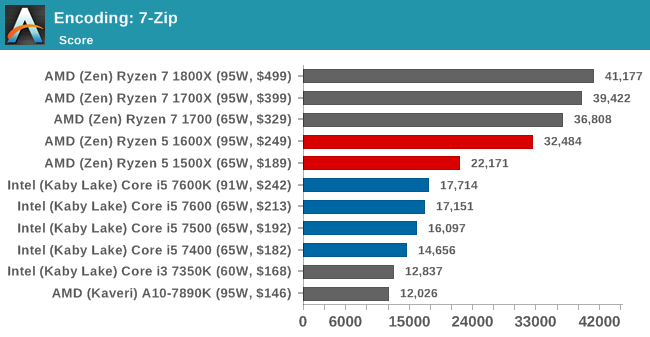
WinRAR 5.40
For the 2017 test suite, we move to the latest version of WinRAR in our compression test. WinRAR in some quarters is more user friendly that 7-Zip, hence its inclusion. Rather than use a benchmark mode as we did with 7-Zip, here we take a set of files representative of a generic stack (33 video files in 1.37 GB, 2834 smaller website files in 370 folders in 150 MB) of compressible and incompressible formats. The results shown are the time taken to encode the file. Due to DRAM caching, we run the test 10 times and take the average of the last five runs when the benchmark is in a steady state.
AES Encoding
Algorithms using AES coding have spread far and wide as a ubiquitous tool for encryption. Again, this is another CPU limited test, and modern CPUs have special AES pathways to accelerate their performance. We often see scaling in both frequency and cores with this benchmark. We use the latest version of TrueCrypt and run its benchmark mode over 1GB of in-DRAM data. Results shown are the GB/s average of encryption and decryption.
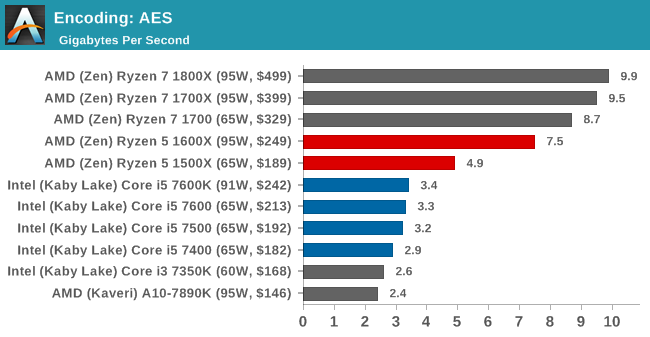
HandBrake H264 and HEVC
As mentioned above, video transcoding (both encode and decode) is a hot topic in performance metrics as more and more content is being created. First consideration is the standard in which the video is encoded, which can be lossless or lossy, trade performance for file-size, trade quality for file-size, or all of the above can increase encoding rates to help accelerate decoding rates. Alongside Google's favorite codec, VP9, there are two others that are taking hold: H264, the older codec, is practically everywhere and is designed to be optimized for 1080p video, and HEVC (or H265) that is aimed to provide the same quality as H264 but at a lower file-size (or better quality for the same size). HEVC is important as 4K is streamed over the air, meaning less bits need to be transferred for the same quality content.
Handbrake is a favored tool for transcoding, and so our test regime takes care of three areas.
Low Quality/Resolution H264: He we transcode a 640x266 H264 rip of a 2 hour film, and change the encoding from Main profile to High profile, using the very-fast preset.
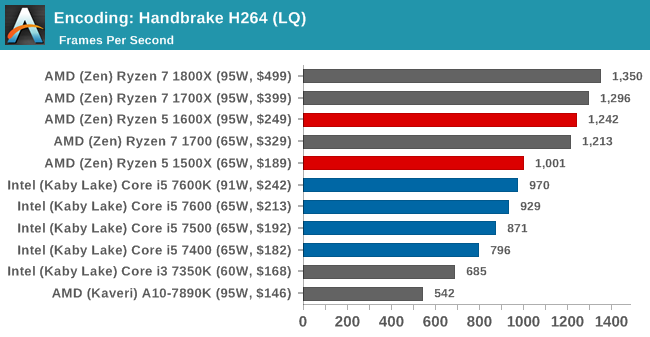
High Quality/Resolution H264: A similar test, but this time we take a ten-minute double 4K (3840x4320) file running at 60 Hz and transcode from Main to High, using the very-fast preset.
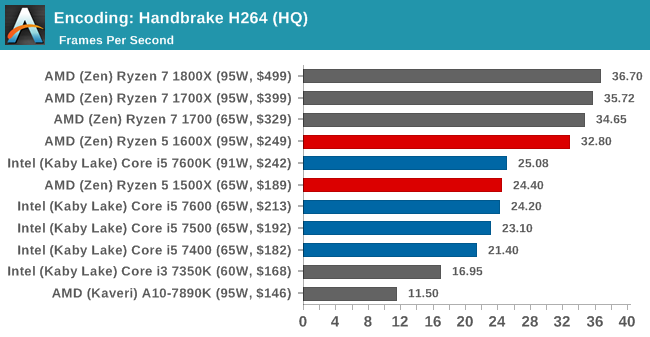
HEVC Test: Using the same video in HQ, we change the resolution and codec of the original video from 4K60 in H264 into 4Kp30 HEVC. This causes a dramatic reduction in filesize (this is a different test to the Ryzen 7 review).
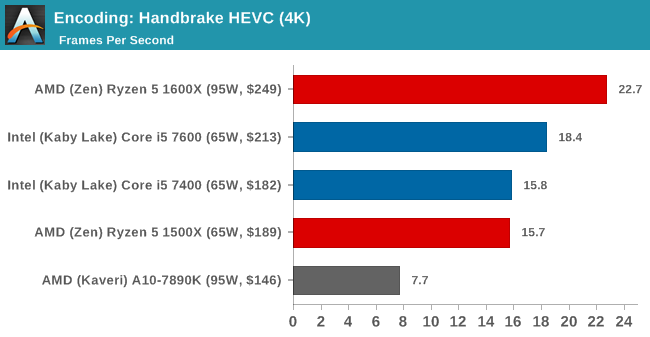


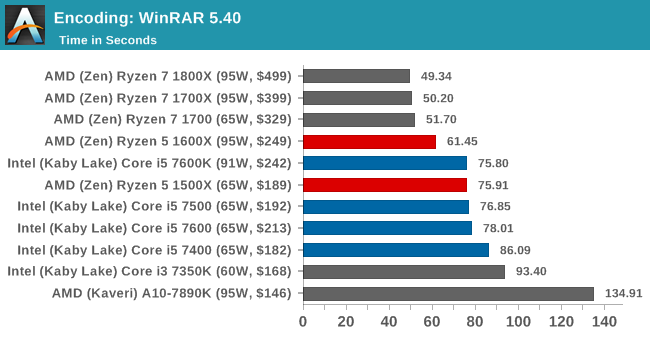








254 Comments
View All Comments
msroadkill612 - Thursday, April 13, 2017 - link
Its worth noting that amd moboS historically tend to endure many revised cpuS. whereas an intel cpu upgrade for a user is bound to require a new mobo."ryzen 2" will probably simply drop into an am4 mobo.
Its also interesting that many or all the mobos i have seen are ready to go for an apu - video connects onboard e.g.
this indicates that raven ridge exists now, for pre-production mobo testing.
msroadkill612 - Thursday, April 13, 2017 - link
I dont believe amd would go to all the trouble of doing zen and vega, and then merge zen with prev gen polaris for the APU.it doesnt make sense from several perspectives. amd philosophy, the architecture seen in ryzen - 2 zen core blocks on a ccx simply becomes one core block and one vega gpu on a single ccx.
it will be a hell of a piece of silicon.
Johan Steyn - Friday, April 14, 2017 - link
Ryzen 9 is not that far fetched. Looking at the server part coming soon, an Ryzen extreme could be happening, especially for workstations. Maybe it might even fit AM4, although unlikely with quad channels. I do not think the current SOC has enough pins. So maybe we might get a Ryzen 9 with plenty of cores and quad channel memory.drajitshnew - Friday, April 14, 2017 - link
Dear Ian,Please clarify a point. You have mentioned that both AMD & Intel have 16 CPU PCIe lanes, but AMD offers 4 pcie lanes for storage from the CPU. If the chipset is loaded this could have an impact on the following 3 situations,
1. If the motherboard manufacturer routes those lanes from m2 to PCIe. Then those could be used, as storage, adding a GPU for GPGPU or a 10GbE NIC for use for a UHD media server, or AIC format storage.
2. With a heavily loaded chipset, a NVMe drive like a 1 TB samsung 960 pro or comparable, may show improved performance, specially in sequential transfers.
3. For a long lived system a large X-point or Z-nand or 3d SLC may show significant latency advantages.
cvearl - Sunday, April 16, 2017 - link
You have odd 480 results on GTA V. Are you using the final run (with the jet) from the built in test? My 480 scores in the mid 70's using your settings on that run with an i7 2600k.cvearl - Sunday, April 16, 2017 - link
Looking back at my GTX 1060 SC results (before I replaced with my 480) It had similar results to what you show here (Assuming the final run of the built in test). Am I to understand that the 480 gets a better result on i7 than Ryzen?Polacott - Monday, April 17, 2017 - link
my experience with AMD processors is that they have aged perfectly. I mean the AMD processors got more support and performance as apps and SO has been prepared to take advantage of more threads as years passed. I would get the Ryzen 1600X without any doubts over the i5.rmlarsen - Monday, April 17, 2017 - link
Unfortunate typo: In the conclusion it says "Looking at the results, it’s hard to notice the effect that 12 threads has on multithreaded CPU tests. " I believe the author meant to write "it's hard NOT to notice".Kamgusta - Tuesday, April 18, 2017 - link
Why in the Earth nobody ever considers the i7-7700?!?! And keep on putting the Ryzen CPUs only against the i5-7600K and/or the i7-7700K?i7-7700 has the same clocks as the i5-7600K, but double the threads and 2MB more L3. It consumes a lot less power than the i7-7700K and no more power than the i5-7600K. You can picture it as a more powerful i5-7600K or as a slight less powerful i7-7700K (but far more efficient).
If anyone is torn between R6-1600 and i5-7600K then the i7-7700 is, quite ironically, the best choice.
Ratman6161 - Tuesday, April 18, 2017 - link
So over the weekend I upgraded my system from an i72600K to a Ryzen 5 1600. First off, I could care less about gaming so I'll put that out there up front. I can buy (in order of real world price)i7 7700K for $300
ryzen 1600x would have been $249
Ryzen 5 1600 was $219
i5 7600K for $210.
I went with the R5 1600. For highly multi threaded tasks (remembering I don't care anything about games about games) the six core R5's compare very favorably with the i7 7700K even though most of the comparisons you see match them up against the i5. And the big difference between the 1600 and the 1600X is clock speed...and they are unlocked. So for me the 1600 ended up being a no-brainer.
So for us non-gamers anyway, i'd disagree with the i7 7700K being the best choice.
Also, when comparing prices, look at the platform price including motherboards. I got an Asrock AB350 Pro 4 for $39 bundled with the CPU so total price $258. Cheapest 7600K bundle at the same place: $315, cheapest 7700K bundle $465.